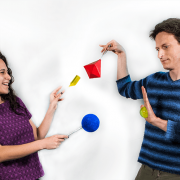It’s not something most Harvard faculty spend much time contemplating, but Tomer Ullman likes to think about magic.
In particular, he likes to think about whether it would be harder to levitate a frog or turn it to stone. And if you’re thinking the answer is obvious (turning it to stone, right?), Ullman says that’s the point.
The reason the answer seems clear, the assistant professor of psychology said, has to do with what researchers call “intuitive physics” — our built-in sense of how the physical world operates. Even young children, he said, understand that there are certain “rules” to the world. Gravity makes things fall, for instance. Large objects weigh more than small ones, and solid objects can’t pass through each other.
But Ullman and co-author John McCoy, assistant professor of marketing at the Wharton School at the University of Pennsylvania, said in a study published in PLOS ONE that intuitive sense not only underpins our understanding of the “real” world but also informs the fictional ones we create.
“We are interested in the structure of the imagination,” Ullman said. “What’s interesting is that, while we exist in a world that has a particular set of rules that we understand, even if we are not scientists … yet we’re capable of conceiving of many different, alternate worlds that deviate from the real world.”
That intuitive understanding, Ullman said, isn’t limited to physics. It’s probably how we make sense of most of the world around us...
Read the whole story on The Harvard Gazette's website using the link below.

